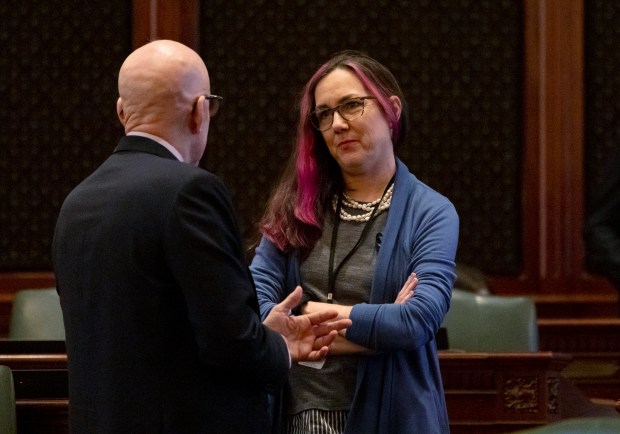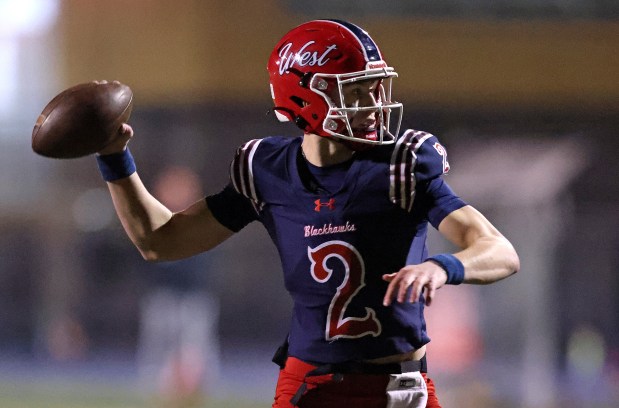In the last year before its demise, the state’s Invest in Kids tax credit scholarship program had a record number of scholarship recipients and substantial jumps in participating schools and contributions.
The program supported more than 15,000 students with scholarships in the 2023-24 academic year, a 56% increase from the previous year, according to Department of Revenue data obtained by the Tribune.
Financial contributions totaled more than $90 million for the program’s final year, up from $75 million last year. However, the number of contributions decreased by about 500 to a total of 4,700 donations. That’s roughly an average donation of $19,400 for the 2023-24 year.
Invest in Kids prompted fierce debate over the merits of what some saw as a volatile school choice program inadvertently taking away dollars from public schools.
Empower Illinois, a scholarship-granting organization based in Chicago, awarded the largest share of money in the 2023-24 academic year, distributing more than half of the total funds collected to roughly 10,000 students across Illinois.
The most common donation received by Empower Illinois was about $1,000, said Bobby Sylvester, executive director for community and government relations.
The hike in donations can be partly attributed to the increased media attention to the issue last summer after Gov. J.B. Pritzker left the measure out of the annual state budget, Sylvester said. Donors, he said, wanted to show they supported the program before legislators voted on whether to extend it.
“Certainly, there were people who were trying to contribute to show that they support this program and that they thought this was a great program that should continue,” Sylvester said.
Signed into law in 2017, Invest in Kids provided a 75% tax credit, capped at $1 million, on donations to private school scholarships, subsidizing tuition for thousands of students.
Students apply for scholarships, and a handful of nonprofits distribute the aid to schools in lump sums, covering a full year of tuition. Eligibility was limited to students whose families earned up to 300% of the poverty level the year before they applied.
The program had support among Republican legislators, who favor a school choice agenda and have fought against public school teachers unions. Democrats were divided on an extension for the program.
State Rep. Will Guzzardi, a Chicago Democrat, said he is not surprised by the recent jump of money contributed for an “extremely lucrative tax benefit.”
Another component of the program for critics was an unfulfilled promise of funding education for students of color, Guzzardi said.
During the 2022-23 school year, no Black students received the scholarships at more than half of the schools participating in the program.
This year, about 45% of schools receiving money did not have a Black student on scholarship, according to the Department of Revenue data.
“I think that this most recent report has a slight improvement over the previous year in that area, but it sort of is a lie to some of the central tenants that the proponents of this program have been arguing for,” he said.
A report released in February by the Illinois State Board of Education showed that elementary school students who received Invest in Kids scholarships lagged in reading and math proficiency on state standardized tests compared with public school students.
Invest in Kids supporters criticized the report for not comparing scholarship students with low-income students in public schools.
Empower Illinois and other proponents of the program plan to continue lobbying for the return of the scholarship program, hoping that the demand for the program will sway the state legislature.
Families are “very, very concerned about how they’re going to make this work in the future and if they can make this work in the future without these scholarships,” Sylvester said. “So we are hopeful that these numbers will show the legislature that the demand is there, that people want this program and families want this program and that it should continue.”
Since the program expired in November, the Archdiocese of Chicago has announced plans to close or consolidate several schools.
One of those schools, St. Frances of Rome in Cicero, will stay open with large financial support from donors and institutional support from the Big Shoulders Fund, one of the Invest in Kids scholarship distributors, which doled out $27 million in 2023-24.
Guzzardi, who has been opposed to the tax credit program since its inception said he does not believe there is an appetite in the legislature to renew the program.
“I know that we never have enough resources to support our traditional neighborhood public school, and I don’t think that we should be diverting our tax resources to philanthropic donors to support their efforts to send money to private schools,” Guzzardi said. “We need to be putting that money into our traditional public schools.”




